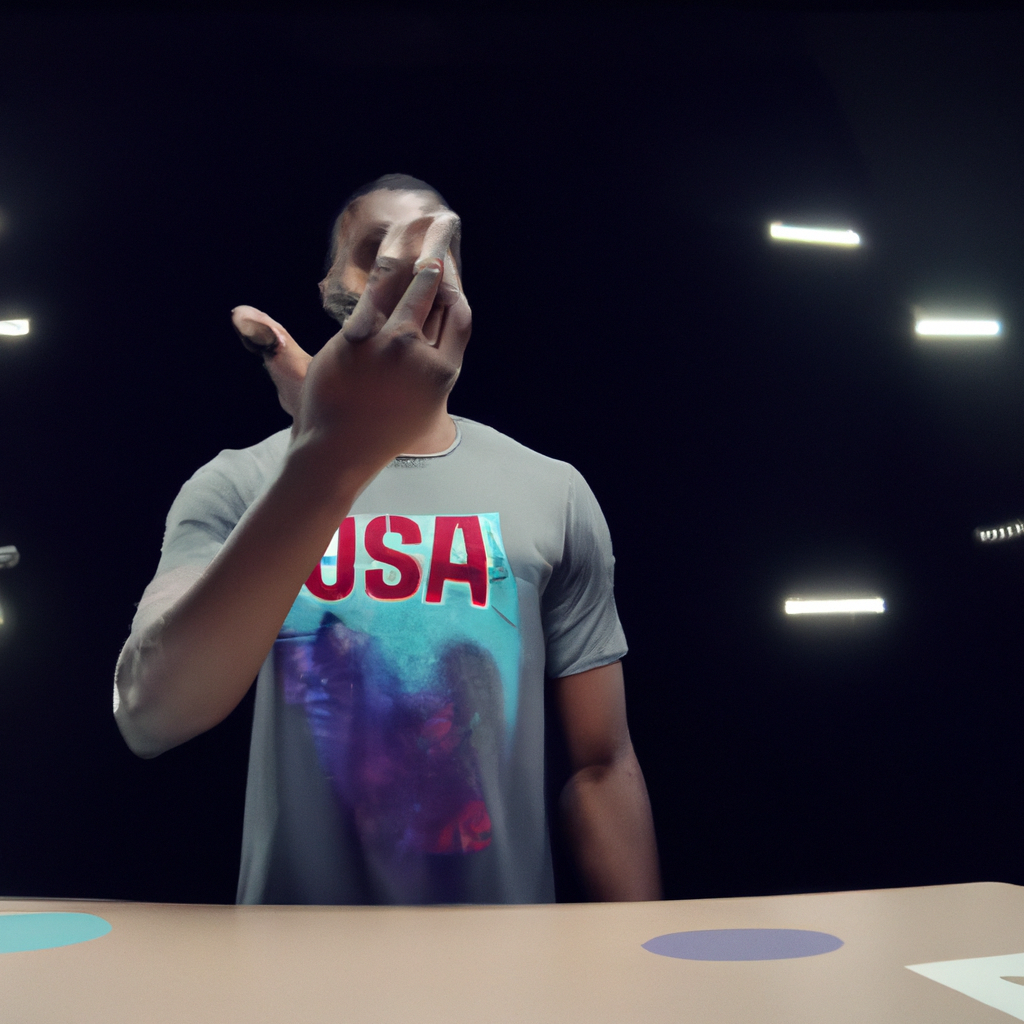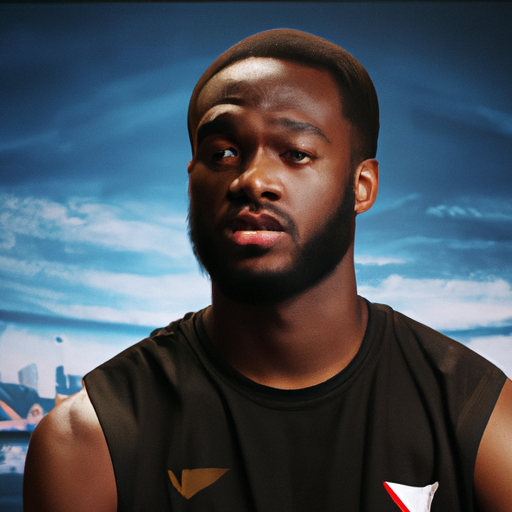Noah Lyles criticizes NBA teams for declaring themselves world champions

The Impact of Noah Lyles’ Criticism on NBA Teams’ World Champion Claims
Noah Lyles, the American sprinter and Olympic gold medalist, recently made headlines for his criticism of NBA teams declaring themselves world champions. Lyles, known for his outspoken nature, took to social media to express his disapproval of this practice, arguing that it diminishes the achievements of athletes from other countries and sports. His comments have sparked a heated debate among sports enthusiasts and raised important questions about the validity of such claims.
Lyles’ main argument revolves around the idea that the term “world champion” should be reserved for competitions that truly encompass the entire world. He believes that NBA teams, despite their undeniable talent and success, cannot rightfully claim this title because they only compete against teams from the United States and Canada. In his view, true world champions should be determined through international competitions that involve teams from various countries.
This criticism has struck a chord with many who feel that the NBA’s self-proclaimed world champion status is unjustified. They argue that it is unfair to label a team as the best in the world when they have not faced competition from other countries. Lyles’ comments have ignited a broader conversation about the importance of inclusivity and recognizing the achievements of athletes from diverse backgrounds.
However, there are also those who defend the NBA’s world champion claims. They argue that the term “world champion” is not meant to be taken literally, but rather as a symbol of excellence and dominance within a specific sport. They contend that the NBA is widely regarded as the premier basketball league in the world, and its teams consistently showcase exceptional skill and talent. Therefore, they believe that NBA teams have every right to declare themselves world champions based on their unparalleled success within their own league.
While Lyles’ criticism may seem directed solely at the NBA, it has broader implications for other sports as well. Many sports, such as American football and baseball, also use the term “world champion” despite primarily competing within their respective countries. Lyles’ comments have prompted a reevaluation of these practices and raised questions about the appropriateness of such claims across various sports.
The impact of Lyles’ criticism extends beyond the sports world. It highlights the importance of recognizing and celebrating the achievements of athletes from all corners of the globe. By challenging the NBA’s world champion claims, Lyles is advocating for a more inclusive and equitable approach to sports. He is urging fans, athletes, and organizations to consider the broader implications of their language and actions, and to strive for a more global perspective.
In conclusion, Noah Lyles’ criticism of NBA teams declaring themselves world champions has sparked a significant debate within the sports community. While some argue that the NBA’s dominance justifies their claim, Lyles contends that the term should be reserved for competitions that truly encompass the entire world. His comments have prompted a broader conversation about inclusivity and the recognition of athletes from diverse backgrounds. Ultimately, Lyles’ criticism serves as a reminder that sports should be a unifying force that celebrates the achievements of athletes from all nations.
Analyzing the Validity of NBA Teams Declaring Themselves World Champions

Noah Lyles, the American sprinter and reigning world champion in the 200 meters, recently made headlines for his criticism of NBA teams declaring themselves world champions. Lyles argued that since the NBA is a league primarily composed of American teams, it is misleading and inaccurate for them to claim such a title. This statement has sparked a debate about the validity of NBA teams declaring themselves world champions.
One of the main points raised by Lyles is the lack of international competition in the NBA. While the league has seen an influx of international players in recent years, the majority of teams and players are still American. This raises the question of whether it is fair for these teams to claim a world championship when they have not faced the best competition from around the globe.
Critics of Lyles’ argument may argue that the NBA is the most competitive basketball league in the world, and therefore, the winner of the NBA Finals can rightfully be considered the world champion. They may point to the fact that many international players choose to play in the NBA because it offers the highest level of competition and exposure. Additionally, the NBA has a long history of producing some of the greatest basketball players in the world, further supporting the claim that its teams are deserving of the world champion title.
However, Lyles’ argument goes beyond just the level of competition. He also raises the issue of cultural diversity and representation. The NBA may be the most competitive league, but it is still predominantly American. By declaring themselves world champions, NBA teams are disregarding the talent and skill of players from other countries who may not have the opportunity to showcase their abilities on such a global stage.
Furthermore, Lyles argues that the NBA’s claim of being world champions perpetuates a sense of American exceptionalism. By asserting their dominance on a global scale, NBA teams are reinforcing the idea that American sports are superior to those played in other countries. This can be seen as disrespectful and dismissive of the rich basketball traditions and talent that exist outside of the United States.
In response to Lyles’ criticism, some NBA players have defended the league’s claim of being world champions. They argue that the NBA is a global brand and that its influence and popularity extend far beyond American borders. They point to the fact that NBA games are broadcasted in countries all over the world and that the league has a significant international fan base. From their perspective, the NBA’s claim of being world champions is a reflection of its global reach and impact.
Ultimately, the debate over the validity of NBA teams declaring themselves world champions is a complex one. While the NBA may be the most competitive basketball league in the world, it is important to consider the lack of international competition and the potential cultural implications of such a claim. As the world becomes increasingly interconnected, it is crucial to recognize and appreciate the talent and diversity that exists in sports beyond national borders.
Noah Lyles’ Perspective: Is It Fair for NBA Teams to Claim World Champion Titles?
Noah Lyles, the renowned American sprinter, recently expressed his criticism towards NBA teams that declare themselves world champions. Lyles argues that this claim is unfair and lacks credibility. While some may dismiss his opinion as irrelevant, it is important to consider the reasoning behind his perspective.
Lyles believes that the term “world champion” should be reserved for competitions that truly encompass teams from all around the globe. In his view, the NBA is a league primarily composed of American teams, with only a handful of international players. Therefore, it is misleading and presumptuous for these teams to label themselves as world champions.
To support his argument, Lyles points out that the NBA is not the only basketball league in the world. There are numerous professional leagues in Europe, Asia, and other continents that boast exceptional talent and fierce competition. These leagues have their own champions, and it would be unfair to disregard their achievements by claiming a global title without facing them in a tournament.
Moreover, Lyles emphasizes the importance of inclusivity and fairness in sports. By declaring themselves world champions, NBA teams are inadvertently dismissing the efforts and skills of players from other countries. This undermines the spirit of international competition and diminishes the significance of global events such as the FIBA World Cup or the Olympic Games.
Lyles also raises the issue of cultural diversity. Basketball is a sport that has gained immense popularity worldwide, with different countries developing their own unique playing styles and strategies. By claiming to be world champions, NBA teams are disregarding the rich basketball heritage and talent that exists beyond American borders. This lack of recognition perpetuates a sense of American exceptionalism and undermines the global nature of the sport.
Critics of Lyles’ perspective argue that the NBA is the most competitive basketball league in the world, with the best players and highest level of competition. They contend that the term “world champion” is justified because NBA teams consistently dominate international competitions, such as the FIBA Basketball World Cup and the Olympic Games.
However, Lyles counters this argument by highlighting the importance of direct competition. While NBA teams may have a higher level of talent, it is crucial to remember that talent alone does not guarantee victory. The unpredictability of sports is what makes them so captivating, and it is only fair to determine a true world champion through a tournament that includes teams from all over the globe.
In conclusion, Noah Lyles’ criticism of NBA teams declaring themselves world champions is a thought-provoking perspective that challenges the status quo. Lyles argues that the term “world champion” should be reserved for competitions that truly encompass teams from all around the globe. He emphasizes the importance of inclusivity, fairness, and cultural diversity in sports. While some may dismiss his opinion, it is essential to consider the reasoning behind his perspective and engage in a meaningful discussion about the true meaning of being a world champion in the context of basketball.

